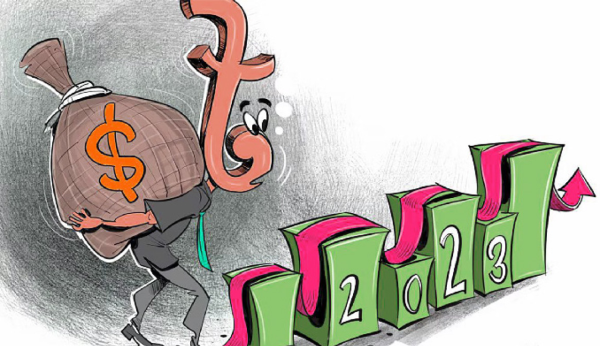Game of exchange rate in Bangladesh
Game of exchange rate in Bangladesh
Game of exchange rate in Bangladesh

The exchange rate has developed into a hotly debated subject in practically every nation’s economy- similar in Bangladesh. Additionally, the exchange rate for the dollar in the country in November of last year was 85 taka. And the present rate is 106.1476 taka but the cost of imports has now gone up. The cost of every dollar has climbed by around 25 taka in a year. As a result, the country is now dealing with a number of unacceptable conditions. The question of the exchange rate arises because different countries have various currencies and because one country’s money cannot be used in another. In essence, the exchange rate refers to the price at which one country’s current currency can be converted into another country’s current currency. The exchange rate can be determined in three ways. The first is a flexible or floating exchange rate, where the government has no hand, rather the exchange rate is determined based on demand and supply. When a product is imported into the country or the citizens of the country invest in other countries’ land, etc., the demand for a foreign currency usually increases. Again, if goods are exported from the country or if other countries invest here, foreign currency comes in hand, and currency is supplied. Its major disadvantage is that the exchange rate changes frequently. As a result, there is uncertainty in the economy. Making big financial decisions becomes difficult. Again, people are attracted to foreign currency thinking that the price of foreign currency will increase in the future. The fixed exchange rate is the second. In this arrangement, the exchange rate is decided by the government or the central bank. The advantage of this approach is that the market economy is balanced and uncertainty is largely eliminated. However, its major disadvantage is that the central bank is always involved in foreign exchange market trading, which has an impact on currency exchange. If not, commercial banks’ ability to lend will be significantly curtailed; as it is today. This exchange rate system also makes the black market more violent and boosts their profits, but it also disrupts the banks’ profitability and the government’s capacity to collect taxes. The two exchange rate systems described above have now been combined to create a new system. It’s known as managed float. In this system, the government sets a maximum and a minimum limit that the price or exchange rate of foreign currency will be and if it goes beyond this limit, the government or the central bank intervenes and Bangladesh follows this. The exchange rate plays a variety of roles in an economy. A country’s commercial system and its citizens’ level of living are dependent on it. Because of this, it is crucial to maintain a stable exchange rate, even if in the modern world, many countries, including Bangladesh, experience severe economic and social issues as a result of this imbalance. At present in Bangladesh, high exchange rates have put pressure on small and medium-sized firms. As a result, costs rise and many traders are cutting back on their operations. They are once again unable to open import credit in response to demand. According to the bank, not having dollars is impossible. They’re in trouble because they can’t get the financing. There is no priority list for loan openings maintained by the Ministry of Commerce or Bangladesh Bank. As a result, several significant imports, such as food, raw materials, and industrial capital equipment, have dropped. The economy sputters as a result of falling imports of industrial capital goods and raw resources. So, we can see the impact on financial investment, employment, and revenue collection. On the other hand, prices rise when imports of food decline. Therefore, people now have to pay substantially greater prices for goods than in the past. In essence, this is talking about inflation and currently, its rate is 9.33 percent. When compared to the start of the year, the dollar was 7.5% stronger at the end of December. However, the currency of Bangladesh has declined in value by almost three times as much as the dollar. According to economists, one of the causes of this is the prolonged artificial increase in the value of money. Despite the fact that there has been inflation in the nation for a while, the value of the dollar has not grown in line with it. Additionally, when the dollar starts to strengthen, its value does not decrease, leading to an imbalance in the market between supply and demand. Currently, Bangladesh is going through that. The International Monetary Fund (IMF) says bad times are yet to come. Global growth will slow further, and inflation will increase. Again, to cover its import obligations, Bangladesh Bank frequently sells dollars from its foreign exchange reserves and so the number of foreign exchange reserves has dropped by $3,573 billion. And the dollar is currently maintaining constant and remittance is now being sent to Hundi as a result. And so, the remittance is consequently slowly decreasing every day. Once more, the government’s entire income and expenditure are now out of balance because of the higher exchange rate. Despite rising spending, the government is not meeting its financial goals. The National Board of Revenue’s (NBR) income fell short by around 5,000 crores taka in the first three months (July-September) of the current fiscal year. These all are happening because of the higher exchange rate which is leading Bangladesh towards recession. So, it’s a matter of great concern to stable the rate and the central bank already has taken some steps. Regarding the initiative of Bangladesh Bank, Sirajul Islam said, apart from providing dollars to banks from foreign exchange reserves, the import of luxury goods has been discouraged, and foreign travel of officials has been canceled. Besides, the banks have been urged to increase the attention of the banks in bringing in export income as well as increasing remittances. Although currency circulation, divestiture, or absorption can always temporarily improve a crumbling economy, they have never been beneficial over the long term. The economy must offer long-term logistics, such as exports, repatriated money, or foreign investment, to shield a country’s currency against a sharp decline. Tariffs and non-tariff trade restrictions should both be eliminated. Ineffective project expenditures should be reduced in order to provide the necessary returns. Consumption that is out of control and corruption should be reduced. In short, the desire for indigenous goods should be elevated above everything others. Additionally, import replacement businesses should be given greater attention.
The author of this article is studying at the Department of Economics, University of Dhaka
 Sumaiya Binte Hossain
Sumaiya Binte Hossain 









